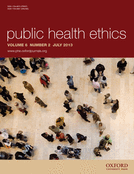-
Views
-
Cite
Cite
Jessica Flanigan, Public Bioethics, Public Health Ethics, Volume 6, Issue 2, July 2013, Pages 170–184, https://doi.org/10.1093/phe/pht022
Close - Share Icon Share
Abstract
In this essay I argue that the same considerations that justify the strong commitment to anti-paternalism that has been affirmed in bioethics over the past half century, also calls for anti-paternalistic public health policies. First, I frame the puzzle—why are citizens morally entitled to make unhealthy and medically inadvisable decisions as patients but not as consumers? I then briefly sketch the reasons why bioethicists typically reject paternalism. Next, I argue that those same reasons tell against paternalism in public health ethics as well. Patients do not waive their rights to make medically inadvisable decisions when they leave their physician’s care. James Wilson disagrees. After I sketch Wilson’s arguments for paternalism in public health policy, I then argue, contra Wilson, that public health paternalism is wrong for the same reason that medical paternalism is wrong, and that the prevalence of paternalism in public policy does not mean that paternalism is morally permissible. I discuss the state’s authority to enforce paternalistic policies and I sketch an anti-paternalist vision for health policymakers. To close, I consider several objections.



